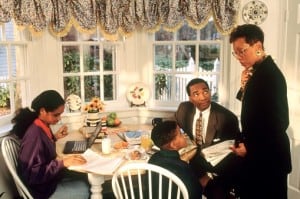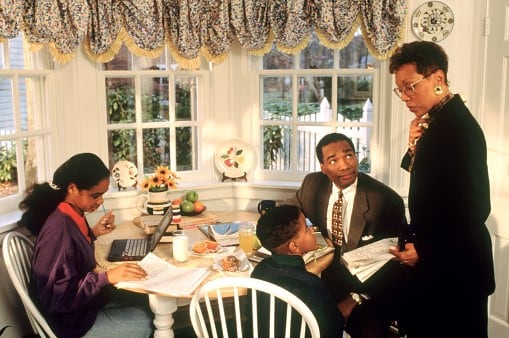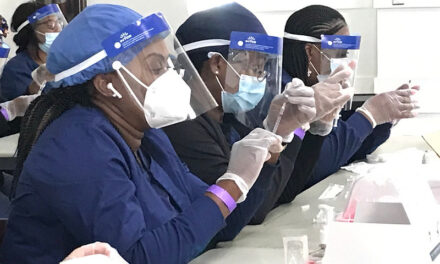
Black parents can help children cope with public reports of violent acts with honest family discussions.
Getty:Chuck Savage
For millions of black women, men and parents, the shockwaves from the last few months of police shootings and killings of black men and women have resulted in sadness and fear, these feelings might be especially acute among our children.
In addition, terrifying instances of violence have be erupting all over the country (Orlando, Dallas) and our world (Nice, Turkey, France). And, thanks to the Internet and the 24-hour news cycle, we are all subjected to a near constant stream of coverage, if we are willing to watch.
Even if you think you and your children are doing fine, a repetitive diet of shocking news and events can lead to post-traumatic stress and depression.
“We’re just inundated,” said Dr. Alan Manevitz, a clinical psychiatrist at Lenox Hill Hospital in New York City, who worked with survivors of the 9/11 terrorist attacks and Hurricane Katrina in 2005. Even with a tragedy occurring thousands of miles away, he said, “because of 24-hour media coverage you can feel threatened … feel that the wolf is at the door,” Manevitz was speaking in an interview with Healthday.com.
First of all, Manevitz advised, it’s normal to feel sadness, confusion or anger in the face of catastrophes. “Anyone can feel a sense of helplessness that the world is a dark and dangerous place.”
Calming Fears
The only way to handle what Manevitz calls the “acute stress” of living with this kind of violence, is to keep it in perspective.
How? By distinguishing between the possibility of something occurring and the actual probability.
Zika virus, he said, is a concern for anyone attending the Olympics this summer in Brazil. But in reality, what are the odds of a Zika-carrying mosquito infecting someone in New York City or Chicago or Seattle?
Some people cope with unsettling news by shutting themselves off from the media. For others, getting as much information as they can helps them put the odds of a threat in context, said Manevitz.
“But people with a susceptibility to PTSD (post-traumatic stress disorder), anxiety or depression may have a more amplified reaction,” he said.
For young children, he recommends restricting media coverage. “Kids 7 and younger don’t understand what they’re seeing and can become anxious or sleepless,” Manevitz said.
For older kids, “it’s best to be involved with what they see so you can explain what’s happening and put disasters in context,” he explained.
While Manevitz advises parents to tell children that they have “police and firemen” to keep them safe, that conversation is obviously more complicated for African American parents.
Beyond preparing children with a family disaster plan for emergencies, black parents should consider talking to children about racism and helping them develop resiliency in light of the recent, highly publicized police attacks and shootings of black women and men.
Also, share your feelings with children, tell them the truth and reassure them, Manevitz said.
As difficult as these topics may be to discuss, parents shouldn’t avoid them, says the American Psychological Association.
“Children often learn or know when something sad or scary happens. If adults don’t talk to them about it, a child may overestimate what is wrong or misunderstand adults’ silence,” according to the association.
Sharing troubling news can also have long-term benefits. “When parents tackle difficult conversations, they let their children know that they are available and supportive,” the psychologists’ group notes.
Manevitz added that parents must keep their own emotions in check. “Parents are role models of coping skills for their children,” he pointed out.
He offers other coping mechanisms for parents to share with their children. For instance, you and your child can write a letter to a victims’ organization or make a donation to a relief agency. Also, discuss your own family disaster plan—what to do if a lockdown occurs at school, for instance.
For young and old, it’s important that you “don’t allow the small possibility of something happening impact your life,” Manevitz stressed.
The U.S. Department of Homeland Security offers this advice to parents of children:
▪ You are their biggest influence. When you can manage your own feelings, you can make disasters less traumatic for your kids.
▪ Encourage dialogue. Listen to your kids. Ask them about their feelings. Validate their concerns.
▪ Answer questions. Give just the amount of information you feel your child needs. Clarify misunderstandings about risk and danger.
▪ Be calm, be reassuring. Discuss concrete plans for safety. Have children and teens contribute to the family’s recovery plan.
▪ Shut off the TV! News coverage of disasters creates confusion and anxiety. Repeated images may lead younger kids to believe the event is recurring. If your children do watch TV or use the Internet, be with them to talk and answer questions.
▪ Find support. Whether you turn to friends, family, community organizations or faith-based institutions, building support networks can help you cope, which will in turn help your children cope.
Visit the American Psychological Association for more tips on discussing tough subjects with your kids.








